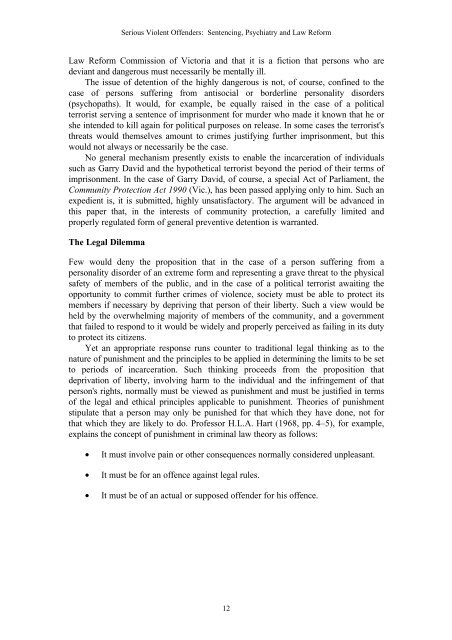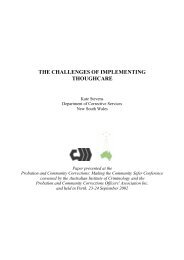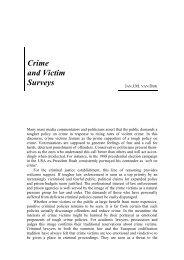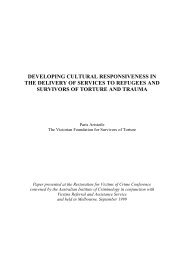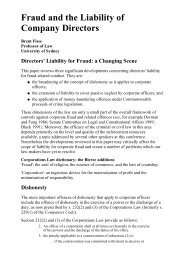Coping with the highly dangerous : issues of principle raised by ...
Coping with the highly dangerous : issues of principle raised by ...
Coping with the highly dangerous : issues of principle raised by ...
Create successful ePaper yourself
Turn your PDF publications into a flip-book with our unique Google optimized e-Paper software.
Serious Violent Offenders: Sentencing, Psychiatry and Law Reform<br />
Law Reform Commission <strong>of</strong> Victoria and that it is a fiction that persons who are<br />
deviant and <strong>dangerous</strong> must necessarily be mentally ill.<br />
The issue <strong>of</strong> detention <strong>of</strong> <strong>the</strong> <strong>highly</strong> <strong>dangerous</strong> is not, <strong>of</strong> course, confined to <strong>the</strong><br />
case <strong>of</strong> persons suffering from antisocial or borderline personality disorders<br />
(psychopaths). It would, for example, be equally <strong>raised</strong> in <strong>the</strong> case <strong>of</strong> a political<br />
terrorist serving a sentence <strong>of</strong> imprisonment for murder who made it known that he or<br />
she intended to kill again for political purposes on release. In some cases <strong>the</strong> terrorist's<br />
threats would <strong>the</strong>mselves amount to crimes justifying fur<strong>the</strong>r imprisonment, but this<br />
would not always or necessarily be <strong>the</strong> case.<br />
No general mechanism presently exists to enable <strong>the</strong> incarceration <strong>of</strong> individuals<br />
such as Garry David and <strong>the</strong> hypo<strong>the</strong>tical terrorist beyond <strong>the</strong> period <strong>of</strong> <strong>the</strong>ir terms <strong>of</strong><br />
imprisonment. In <strong>the</strong> case <strong>of</strong> Garry David, <strong>of</strong> course, a special Act <strong>of</strong> Parliament, <strong>the</strong><br />
Community Protection Act 1990 (Vic.), has been passed applying only to him. Such an<br />
expedient is, it is submitted, <strong>highly</strong> unsatisfactory. The argument will be advanced in<br />
this paper that, in <strong>the</strong> interests <strong>of</strong> community protection, a carefully limited and<br />
properly regulated form <strong>of</strong> general preventive detention is warranted.<br />
The Legal Dilemma<br />
Few would deny <strong>the</strong> proposition that in <strong>the</strong> case <strong>of</strong> a person suffering from a<br />
personality disorder <strong>of</strong> an extreme form and representing a grave threat to <strong>the</strong> physical<br />
safety <strong>of</strong> members <strong>of</strong> <strong>the</strong> public, and in <strong>the</strong> case <strong>of</strong> a political terrorist awaiting <strong>the</strong><br />
opportunity to commit fur<strong>the</strong>r crimes <strong>of</strong> violence, society must be able to protect its<br />
members if necessary <strong>by</strong> depriving that person <strong>of</strong> <strong>the</strong>ir liberty. Such a view would be<br />
held <strong>by</strong> <strong>the</strong> overwhelming majority <strong>of</strong> members <strong>of</strong> <strong>the</strong> community, and a government<br />
that failed to respond to it would be widely and properly perceived as failing in its duty<br />
to protect its citizens.<br />
Yet an appropriate response runs counter to traditional legal thinking as to <strong>the</strong><br />
nature <strong>of</strong> punishment and <strong>the</strong> <strong>principle</strong>s to be applied in determining <strong>the</strong> limits to be set<br />
to periods <strong>of</strong> incarceration. Such thinking proceeds from <strong>the</strong> proposition that<br />
deprivation <strong>of</strong> liberty, involving harm to <strong>the</strong> individual and <strong>the</strong> infringement <strong>of</strong> that<br />
person's rights, normally must be viewed as punishment and must be justified in terms<br />
<strong>of</strong> <strong>the</strong> legal and ethical <strong>principle</strong>s applicable to punishment. Theories <strong>of</strong> punishment<br />
stipulate that a person may only be punished for that which <strong>the</strong>y have done, not for<br />
that which <strong>the</strong>y are likely to do. Pr<strong>of</strong>essor H.L.A. Hart (1968, pp. 4–5), for example,<br />
explains <strong>the</strong> concept <strong>of</strong> punishment in criminal law <strong>the</strong>ory as follows:<br />
• It must involve pain or o<strong>the</strong>r consequences normally considered unpleasant.<br />
• It must be for an <strong>of</strong>fence against legal rules.<br />
• It must be <strong>of</strong> an actual or supposed <strong>of</strong>fender for his <strong>of</strong>fence.<br />
12


